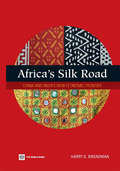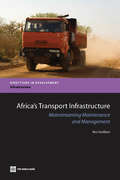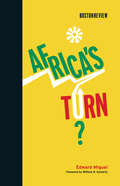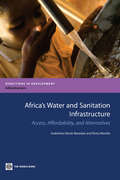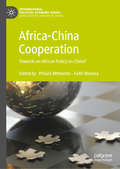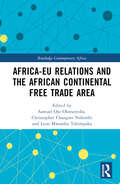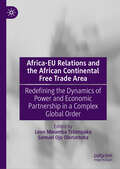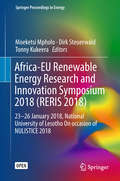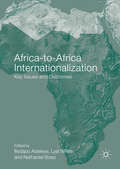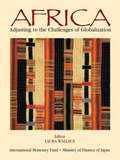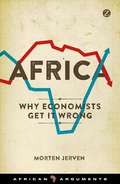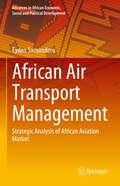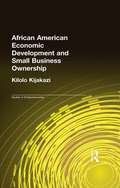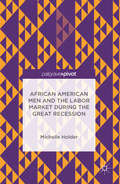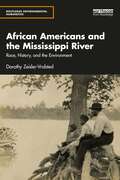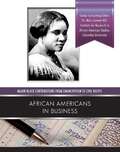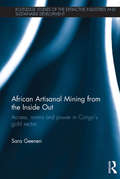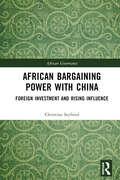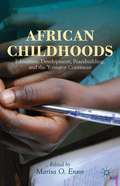- Table View
- List View
Africa's Silk Road: China and India's New Economic Frontier
by Harry G. BroadmanChina and India's new-found interest in trade and investment with Africa - home to 300 million of the globe's poorest people and the world's most formidable development challenge - presents a significant opportunity for growth and integration of the Sub-Saharan continent into the global economy. Africa's Silk Road finds that China and India's South-South commerce with Africa is about far more than natural resources, opening the way for Africa to become a processor of commodities and a competitive supplier of goods and services to these countries - a major departure from its long established relations with the North. A growing number of Chinese and Indian businesses active in Africa operate on a global scale, work with world-class technologies, produce products and services according to the most demanding standards, and foster the integration of African businesses into advanced markets.There are significant imbalances, however, in these emerging commercial relationships. These can be addressed through a series of reforms in all countries: 'At-the-border' reforms, such as elimination of China and India's escalating tariffs on Africa's leading exports, and elimination of Africa's tariffs on certain inputs that make exports uncompetitive 'Behind-the-border' reforms in Africa, to unleash competitive market forces and strengthen its basic market institutions 'Between-the-border' improvements in trade facilitation mechanisms to decrease transactions costs Reforms that leverage linkages between investment and trade, to allow African businesses to participate in global production networks that investments by Chinese and Indian firms can generate.
Africa's Trade Revisited
by Arvind Subramanian Natalia TamirisaThe popular impression that Africa has not integrated into world trade, as suggested by the evolution in simple indicators, has been callled into question recently by more formal analysis. This paper refines and generalizes this analysis, but lends supports to the popular view of disintegration. Africa, especially francophone Africa, is currently under-exploiting its trading opportunities and has witnessed disintegration over time, a trend that is most pronunced in its trade with the technologically advanced countries.
Africa's Transport Infrastructure
by Kenneth GwilliamThis book presents and analyzes the results of a comprehensive collection of data on the extent and condition of transport infrastructure in Sub-Saharan Africa, identifies the reasons for poor performance, and estimates future financing needs. The transport facilities of Sub-Saharan Africa were built primarily for the colonial exploitation of mineral and agricultural resources. The chief goal of road and rail networks was to link mines, plantations, and other sites for the exploitation and transformation on natural resources to ports, rather than to provide general connectivity within the region. The road network of 1.75 million kilometers exhibits a low density with respect to population. Its average spatial density is very low by world standards. The network carries low average traffic levels. Even so, because most African countries have a low GDP, the fiscal burden of the network is the highest among world regions, maintenance is underfinanced, and road conditions are on average poor, while road accident rates are very high. Attempts to improve the financing of maintenance through "second generation road funds" have met with some success, but there remain serious weaknesses in implementation. Road freight transport is fragmented, but cartelized, with high rates and high profits. Railways were also built mainly as for the exportation of minerals and crops. With the exception of two or three very specialized bulk mineral lines, the traffic volumes are low, and the railways have been in financial decline since the 1960s. Concessioning of the lines to private operators has improved performance, but governments often impose unachievable requirements on the companies, and investment remains inadequate for long-term sustainability. Most of the 260 airports that provide year-round commercial service in Sub-Saharan Africa have adequate runway capacity, though some of the larger airports suffer from a shortage of terminal capacity. More than a quarter of the runways are in marginal or poor condition, and air traffic control and navigation facilities are below international standards. Though airport charges are high, few airports are truly financially sustainable. Three national carriers are quite successful, but most are small and barely sustainable. Protection persists in the domestic and intercontinental markets, but the international market in the region has been effectively liberalized. The safety record is poor. Most ports are small by international standards. Many are still publicly owned and suffer from inadequate equipment and poor productivity. Only a few highly specialized ports, including private ports integrated with the extraction companies, meet the highest international standards Costs and charges are high. But there is a trend toward concessioning of facilities to large groups specializing in international container terminals and port operations. Fortunately the shipping market is now deregulated. Urban transport suffers from some infrastructure deficiencies, particularly in the condition of urban roads. But the main problems of the sector are associated with the fragmented and poorly regulated nature of most urban bus markets. Finance for large buses is very difficult to obtain. In all modes the situation is made worse by failures of governance in both the provision and regulation of infrastructure. The overall deficit in financing for infrastructure is estimated using a model based on the application of hypothesized standards of connectivity for all modal networks and facilities. Once the amount of infrastructure needed to meet those standards was calculated, these "requirements" were compared with existing stocks and the costs of making the transition over a ten-year period were calculated. A "base" scenario used standards similar to those pertaining in developed regions, while a "pragmatic" scenario applied lower standards. In a separate exercise, the actual average expenditures on transport infrastructure from all sources were researched. This allowed the funding gap to be deduced by subtraction....
Africa's Turn? (Boston Review Books)
by Edward MiguelSigns of hope in sub-Saharan Africa: modest but steady economic growth and the spread of democracy.By the end of the twentieth century, sub-Saharan Africa had experienced twenty-five years of economic and political disaster. While “economic miracles” in China and India raised hundreds of millions from extreme poverty, Africa seemed to have been overtaken by violent conflict and mass destitution, and ranked lowest in the world in just about every economic and social indicator. Working in Busia, a small Kenyan border town, economist Edward Miguel began to notice something different starting in 1997: modest but steady economic progress, with new construction projects, flower markets, shops, and ubiquitous cell phones. In Africa's Turn? Miguel tracks a decade of comparably hopeful economic trends throughout sub-Saharan Africa and suggests that we may be seeing a turnaround. He bases his hopes on a range of recent changes: democracy is finally taking root in many countries; China's successes have fueled large-scale investment in Africa; and rising commodity prices have helped as well. Miguel warns, though, that the growth is fragile. Violence and climate change could derail it quickly, and he argues for specific international assistance when drought and civil strife loom. Responding to Miguel, nine experts gauge his optimism. Some question the progress of democracy in Africa or are more skeptical about China's constructive impact, while others think that Miguel has underestimated the threats represented by climate change and population growth. But most agree that something new is happening, and that policy innovations in health, education, agriculture, and government accountability are the key to Africa's future.ContributorsOlu Ajakaiye, Ken Banks, Robert Bates, Paul Collier, Rachel Glennerster, Rosamond Naylor, Smita Singh, David N. Weil, and Jeremy M. Weinstein
Africa's Water and Sanitation Infrastructure
by Sudeshna Ghosh Banerjee Elvira MorellaThe welfare implications of safe water and sanitation cannot be overstated. The economic gains from provision of improved services to millions of unserved Africans in enormous. The international adoption of Millennium Development Goals brought the inadequacies of service provision sharply into focus. With only 58% and 31% enjoying access to water and sanitation services respectively, Sub-Saharan Africa is the only continent that is off-track in achieving the MDGs in 2015. The problem is compounded by the fact that a rigorous and credible baseline did not exist on coverage to improved water and sanitation and resources required to meet the MDGs. This book aims to contribute to this gap by collecting a wealth of primary and secondary information to present the most up-to-date and comprehensive quantitative snapshot of water and sanitation sectors. The book evaluates the challenges to the water and sanitation sectors within the urban and rural areas and deepen our understanding of drivers of coverage expansion in the context of financing, institutional reforms, and efficiency improvements. Finally, the book establishes the investment needs for water and sanitation with a target of meeting the MDGs and compares with the existing financing envelopes, disaggregated by proportions that can be recouped by efficiency gains and net financing gaps. The directions for the future draw on lessons learned from best practices and present the menu of choices available to African countries. There is no recipe book that neatly lays out the possible steps the country should adopt to enhance coverage and quality of service. The challenges differ to a significant extent among African countries and solutions must be tailored to individual national or regional conditions.
Africa-China Cooperation: Towards an African Policy on China? (International Political Economy Series)
by Philani Mthembu Faith MaberaThis book offers a range of perspectives on the Africa–China partnership in the context of the Forum on China and Africa Cooperation (FOCAC). Incorporating historical, political, social and cultural dimensions, it offers innovative views on the Africa–China relationship that combine theory and practice, and critically examines the prospects of a Pan-African policy towards China, complementary to China’s comprehensive African policy. The chapters address a number of key questions, including: What steps are being taken to achieve a more coordinated approach and policy towards China on the African continent? Does Africa even need a collective strategy in the first place? How would a coherent policy framework affect Africa’s relations with Europe and other external partners? How do the pillars of the partnership align with the African Union’s Agenda 2063 and the United Nation’s 2030 Agenda for Sustainable Development?
Africa-EU Relations and the African Continental Free Trade Area (Routledge Contemporary Africa)
by Samuel Ojo Oloruntoba, Christopher Changwe Nshimbi and Leon Mwamba TshimpakaThis book explores relations between states in the Africa–European Union in view of the African Continental Free Trade Area, both at a regional level and as a series of informal processes of socioeconomic and political interactions between state and non-state actors. The book reconsiders the ways in which actors in the Africa–European Union relationship function, and what that means for regionalism, regionalisation and regional integration. In addition to formalised state-to-state and inter-regional interactions, the book examines the impact of socio-economic and political interactions with non-state actors, including those who engage with regional integration through formal and informal processes such as civil society activists, “African migration evangelists”, human smugglers and human traffickers. The book thus demonstrates that regional and inter-regional engagements include issues that extend beyond the usual discussions of trade. The book is authored from an African perspective and will be of interest to academics who specialise in International Relations, Political Economy, Political Sociology and African Studies. Policy makers and various actors in civil society and think tanks who have an academic inclination and deal with trade, migration and regionalism in Africa and Africa’s relations with Europe will also find the book beneficial.
Africa-EU Relations and the African Continental Free Trade Area: Redefining the Dynamics of Power and Economic Partnership in a Complex Global Order
by Samuel Ojo Oloruntoba Leon Mwamba TshimpakaThis book examines the establishment and implementation of the AfCFTA, which is the largest free trade area globally, covering 54 African countries. It explores how this initiative has the potential to reshape Africa-EU relations by promoting intra-African trade, economic integration, and diversification, as well as inter- regional trade. Both continents have potential to serve as global actors in reshaping the global order in ways that can affect how multilateralism foster inclusive development. However, whether this will happen would be a function of how the EU and AU define their interests and relationship.
Africa-EU Renewable Energy Research and Innovation Symposium 2018: 23–26 January 2018, National University of Lesotho On occasion of NULISTICE 2018 (Springer Proceedings in Energy)
by Moeketsi Mpholo Dirk Steuerwald Tonny KukeeraThis open access book presents the proceedings of the 2nd Africa-EU Renewable Energy Research and Innovation Symposium (RERIS 18), held in Maseru, Lesotho in January 2018. The symposium aimed to foster research cooperation on renewable energy between Africa and Europe – in academia, as well as the private and public sectors. Addressing thematic areas such as• Grid-connected renewable energy;• Decentralised renewable and household energy solutions;• Energy socioeconomics; and• Promotion of energy research, innovation, education and entrepreneurship,the book brings together contributions from academics and practitioners from the EU and Africa to enable mutual learning and knowledge transfer – a key factor in boosting sustainable development in the African renewable energy market. It also plays a significant role in promoting African renewable energy research, which helps to secure energy supply in both rural and urban areas and to increase generation capacities and energy system resilience. This book is an invaluable resource for academics and professionals across the renewable energy spectrum.
Africa-to-Africa Internationalization: Key Issues and Outcomes (AIB Sub-Saharan Africa (SSA) Series)
by Ifedapo Adeleye Lyal White Nathaniel BosoHighlighting an important emerging trend in FDI to Africa, thisbook consists of important contributions focusing on an increase in trade andinvestment between African countries. An area that until now has receivedlittle attention, this volume aims to define the key issues and explores thechallenges and outcomes that have characterized Africa-to-Africainternationalization, providing guidance on directions for future research. Africa-to-Africa Internationalizationincludes both conceptual and empirical contributions, illustrating thepractical issues in intra-African trade and investment. Providing readers witha deep sense of the realities and challenges of cross-border investments withinthe region, the cases included in the book are useful pedagogical materials forfaculty members interested in teaching international business in the Africancontext.
Africa: Why Economists Get It Wrong (African Arguments)
by Morten JervenNot so long ago, Africa was being described as the 'Hopeless Continent'. Recently, though, talk has turned to 'Africa Rising', with enthusiastic voices exclaiming the potential for economic growth across many of its countries. What, then, is the truth behind Africa's growth, or lack of it? In Is Africa Rising?, Morten Jerven fundamentally reframes the debate, challenging mainstream accounts of African economic history. Whilst for the past two decades experts have focused on explaining why there has been a 'chronic failure of growth' in Africa, Jerven shows that most African economies have been growing at a rapid pace since the mid-90s. In addition, African economies grew rapidly in the 50s, the 1960s, and even into the 1970s. Thus, African states were dismissed as incapable of development based largely on observations made during the 1980s and early 1990s. The result has been misguided analysis, and few practical lessons learned. An essential account of the real impact economic growth has had on Africa, and what it means for the continent's future.
African Air Transport Management: Strategic Analysis of African Aviation Market (Advances in African Economic, Social and Political Development)
by Eyden SamunderuThis book provides a comprehensive overview of the African air transport market from a strategic management perspective. Drawing on well-grounded theories, research applications and real-world case studies, it examines competition dynamics, interconnectivity, the growth of low-cost carriers, and demand patterns in air transport for both passenger and cargo traffic. It also presents an expert analysis on the introduction of the Single African Air Transport Market (SAATM), made possible by the liberalization of the air transport market, from a regulatory perspective. Based on the results of the analysis, the book evaluates both the benefits and limitations of an open skies agreement. Furthermore, it shed lights on the challenges and complexities of African public infrastructure investments and airport financing, discusses the impact of COVID-19, and provides strategic recommendations for airlines. The book is aimed at professionals in aviation and airline industries and students interested in the African air transport market.
African American Economic Development and Small Business Ownership (Garland Studies in Entrepreneurship)
by Kilolo KijakaziFirst Published in 1997. Routledge is an imprint of Taylor & Francis, an informa company.
African American Inequality in the United States
by Janice H. Hammond A. Kamau Massey Mayra GarzaThis note describes how historical and on-going policies and practices that discriminate against African Americans led to present-day inequality. Topics include slavery, segregation, Jim Crow laws, "black codes," and policies and practices relating to criminal justice, housing, and education.
African American Men and the Labor Market during the Great Recession
by Michelle HolderThis book analyzes the status and position of African American men in the U.S. labor market prior to, during, and after the Great Recession. Using a model of occupational crowding, the book outlines how the representation of African American men in major occupational categories almost universally declined during the recent recession even as white non-Hispanic men were able to maintain their occupational representation in the face of staggering job losses. Using US Census Bureau data, this book illustrates how African American men sought to insulate their group from devastating job losses by increasing their educational attainment in a job market where employers exercised more leverage in hiring. However, this strategy was unable to protect this group from disparate job losses as African American men became further marginalized in the workforce during the Great Recession. Policy approaches to address high African American male unemployment are outlined in the final chapter.
African Americans and the Mississippi River: Race, History, and the Environment (Routledge Environmental Humanities)
by Dorothy Zeisler-VralstedThis book follows the historical trajectory of African Americans and their relationship with the Mississippi River dating back to the 1700s and ending with Hurricane Katrina and the still-contested Delta landscape. Long touted in literary and historical works, the Mississippi River remains an iconic presence in the American landscape. Whether referred to as "Old Man River" or the "Big Muddy," the Mississippi River represents imageries ranging from the pastoral and Acadian to turbulent and unpredictable. However, these imageries—revealed through the cultural production of artists, writers, poets, musicians, and even filmmakers—did not reflect the experiences of everyone living and working along the river. Missing is a broader discourse of the African American community and the Mississippi River. Through the experiences of African Americans with the Mississippi River, which included narratives of labor (free and enslaved), refuge, floods, and migration, a different history of the river and its environs emerges. The book brings multiple perspectives together to explore this rich history of the Mississippi River through the intersection of race and class with the environment. The text will be of great interest to students and researchers in environmental humanities, including environmental justice studies, ethnic studies, and US and African American history.
African Americans in Business (Major Black Contributions from Emancipat)
by Tish DavidsonMany people dream of owning their own business or making it to the top of the corporate ladder. In the pages of this book, you'll meet African Americans who overcame obstacles and stereotypes to make their dreams a reality. Madam C. J. Walker was orphaned at age 7, married at 14, became a mother at 18, and was widowed at 20. She went on make a million dollars selling hair care products. Berry Gordy loved music but went broke after opening a record store. He didn't give up, though. Gordy eventually started Motown Records, which became one of the country's most successful record labels and introduced a host of talented black artists to mainstream American audiences. Stanley O'Neal grew up on a farm without running water or indoor toilets. Through intelligence and hard work he became the head of a $50 billion investment bank. Read about these and other inspiring figures in this book.
African Artisanal Mining from the Inside Out: Access, norms and power in Congo’s gold sector (Routledge Studies of the Extractive Industries and Sustainable Development)
by Sara GeenenArtisanal mining is commonly associated with violent conflict, rampant corruption and desperate poverty. Yet millions of people across Sub Sahara Africa depend on it. Many of them are living in eastern Democratic Republic of Congo (DRC), home to important mineral reserves, but also to a plethora of armed groups and massive human rights violations. African Artisanal Mining from the Inside Out provides a rich and in-depth analysis of the Congolese gold sector. Instead of portraying miners and traders as passive victims of economic forces, regional conflicts or disheartening national policies, it focuses on how they gain access to and benefit from gold. It shows a professional artisanal mining sector governed by a set of specific norms, offering ample opportunities for flexible employment and local livelihood support and being well-connected to the local economy and society. It argues for the viability of artisanal gold mining in the context of weak African states and in the transition towards a post-conflict and more industrialized economy. This book will be of great interest to researchers and postgraduates studying natural resources and development as well as those in development studies, African studies, sociology, political economy, political ecology, legal pluralism, and history.
African Bank Investments Limited (A)
by Lynn Sharp Paine Will HurwitzLess than a year after joining the board of African Bank Investments Limited (ABIL), the newest director finds himself in difficult discussions with other directors about removing the struggling company's CEO. The case is set in South Africa in mid-2014 as shares in ABIL, which traded on the Johannesburg Stock Exchange, are declining precipitously. The case describes ABIL's origins and evolution, including the acquisition and growth of its wholly owned subsidiary African Bank, a provider of unsecured loans to help individuals pay for expenses such as vehicle repairs, home renovations, funeral costs, medical bills, and education. As ABIL's profits rose and share price soared, it became the darling of analysts. However, when the South African economy turned sour, customers started defaulting on their loans, and ABIL and African Bank began to struggle. As ABIL's stock price dropped, the management team faced difficult questions about the company's lending practices, risk management processes, and plans to turn the business around. By 2014, the situation was grim, and pressure mounted from shareholders and market regulators for the board to take action. The case details the history of unsecured lending in South Africa, describes the regulatory, social, and legal contexts for the company and its business model, and explores the company's unique corporate structure and executive and director dynamics.
African Bank Investments Limited (B)
by Lynn Sharp Paine Will HurwitzLess than a year after joining the board of African Bank Investments Limited (ABIL), the newest director finds himself in difficult discussions with other directors about removing the struggling company's CEO. The case is set in South Africa in mid-2014 as shares in ABIL, which traded on the Johannesburg Stock Exchange, are declining precipitously. The case describes ABIL's origins and evolution, including the acquisition and growth of its wholly owned subsidiary African Bank, a provider of unsecured loans to help individuals pay for expenses such as vehicle repairs, home renovations, funeral costs, medical bills, and education. As ABIL's profits rose and share price soared, it became the darling of analysts. However, when the South African economy turned sour, customers started defaulting on their loans, and ABIL and African Bank began to struggle. As ABIL's stock price dropped, the management team faced difficult questions about the company's lending practices, risk management processes, and plans to turn the business around. By 2014, the situation was grim, and pressure mounted from shareholders and market regulators for the board to take action. The case details the history of unsecured lending in South Africa, describes the regulatory, social, and legal contexts for the company and its business model, and explores the company's unique corporate structure and executive and director dynamics.
African Bargaining Power with China: Foreign Investment and Rising Influence (African Governance)
by Christina SeyfriedThis book provides a detailed account of the political economy around investment deal negotiations between African governments and private Chinese investors. The book draws on evidence from experiments and hundreds of interviews with policy makers and Chinese investors across Nigeria, South Africa, Kenya, Ethiopia and Tanzania. It shows that governments of authoritarian or one-party dominant states, which are among the top-receivers of Chinese investments, are able to easily and successfully act collectively to impose human capital and technology transfer requirements. The book argues that, rather than treating African countries as "price-takers" in the face of increasing Chinese influence in the continent, we should instead recognise the significant bargaining leverage that many African governments have to influence deal conditions, especially with smaller private Chinese companies. It demonstrates that several African governments can instead act "as price-setters" and that the success of the rising Chinese presence in Africa, and whether this leads to positive or negative development outcomes, fundamentally depends on the development strategies that individual African governments decide on. In the context of an often-polarised debate, the original research presented in this book has important implications for the future economic development strategies of African countries. As such, it will be of interest to researchers working on Chinese and African investment, politics, institutions, business, economics, and international relations.
African Childhoods
by Marisa O. EnsorWith 70 per cent of its people under the age of 30, Africa is the world's youngest continent. African youngsters have been largely characterized as either vulnerable victims of the frequent humanitarian crises that plague their homelands, or as violent militarized youth and 'troubled' gang members. Young people's contributions to processes of educational provision, peace building and participatory human development in Africa are often ignored. While acknowledging the profound challenges associated with growing up in an environment of uncertainty and deprivation, African Childhoods sheds light on African children's often constructive engagement with a variety of societal conditions, adverse or otherwise, and their ability to positively influence their own lives and those of others.
African Communications Group
by Anita M. Mcgahan Dale O. CoxeDescribes the opportunities that confront the African Communications Group, an entrepreneurial organization that plans to introduce a wireless pay-phone system in Tanzania. Provides a foundation for the analysis of value creation and of value capture. The possibility of entry by other companies, the presence of a large supplier, and uncertainties about demand all create important tradeoffs for the new venture.
African Department: Expenditure Composition and Economic Development in Benin
by Marco Pani Mohamed El HarrakThis paper estimates how changes in the composition of public expenditure affect growth, employment, and income inequality in Benin. These estimates are based on a model of labor market segmentation with partial labor mobility along the lines of Harris and Todaro (1970). The model is calibrated to fit the data for the Beninese economy over the period 2003-07. Despite some data limitation, the results obtained suggest that a shift in the composition of expenditure from wages to public investment would have beneficial effects on growth, employment, and income equality, particularly through its effects on wages and labor demand in the private formal sector; conversely, an increase in civil servants' wages, even if it were financed by grants, could result in lower growth, higher unemployment, and larger wage disparities across sectors.
